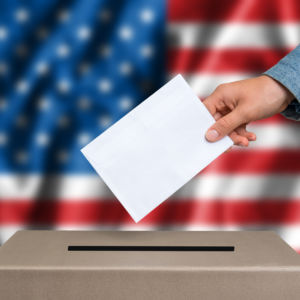Editor’s Note: For an alternative viewpoint, please see Point: Make Election Day A Holiday.
In the most recent midterm election, about 37 percent of eligible voters cast a ballot. In the 2016 general election, 58 percent of eligible voters exercised their right to vote. Based on recent voter turnout, some are calling for a federal holiday on Election Day to make it easier for Americans to vote. However, this is a bad idea because a federal voting holiday is unnecessary and could cause more harm than good.
Besides the fact that Americans have ample opportunities to vote other than on Election Day — more on this later — a federal voting holiday would create headaches for businesses and employees nationwide. Schools would close, leaving many working parents without child care. Consequently, these parents would either have to take a day off or pay for child care services while they are at work. Either way, it is a no-win situation for millions of Americans (not to mention another day American students will not be in classrooms).
Notwithstanding the hassle that working families with children would encounter if Election Day becomes a federal holiday, all Americans would be inconvenienced in some form or fashion. A federal holiday means that financial institutions, the Postal Service and several government offices would be closed. Even worse, numerous retailers and other employers would also shut down in observance of the federal holiday, producing an economic drag.
In other words, making Election Day a federal holiday would cause all sorts of unnecessary troubles for far too many Americans.
Aside from the economic argument against an Election Day federal holiday, there also remains a valid concern that the federal government should refrain from intruding into elections.
According to the Constitution’s Election Clause: “The Times, Places and Manner of holding Elections for Senators and Representatives, shall be prescribed in each State by the Legislature thereof.” In other words, states are responsible for holding elections — not the federal government.
Federalism is a bedrock principle of the United States, and one way that it is preserved is through states retaining power over elections. Although declaring Election Day a federal holiday would not immediately threaten the sanctity of federalism, it would surely undermine it. In general, the less federal government involvement in elections, the better.
In addition to these valid concerns, citizens in every single state and the District of Columbia have the opportunity to vote well before Election Day. In fact, every state permits eligible voters to request an absentee ballot that allows them to vote ahead of Election Day. Twenty-seven states and the District of Columbia allow voters to request absentee ballots without an excuse for why they cannot vote on Election Day. And the 20 states that require excuses for absentee ballots commonly accept conflicting work hours and a laundry list of other reasons.
Moreover, in 37 states, Americans can vote in person before Election Day. On average, early voting starts 22 days before Election Day.
Logistically, voting on Election Day is easier than ever. In most states, polls are open before dawn and well after dusk. Polling hours are plastered around the community, and polling places must remain open for all eligible voters in-line before the scheduled time for the polls to close.
Furthermore, the United States contains more than 100,000 polling locations, making it as trouble-free as possible for voters to reach their designated voting sites. In many urban areas, polling places are located within blocks of voters’ residences. Even more, many states provide mobile voting stations to places such as nursing homes, making it as convenient as possible for those who cannot travel to a polling place on Election Day (just in case they choose not to vote by mail).
In short, Americans have plenty of chances to vote, even if they are unable to make it to the polls on Election Day.
For more than 200 years, Americans have managed to vote without Election Day being deemed a federal holiday. Furthermore, technology and other reforms have made voting easier than ever. Americans who choose not to exercise their voting rights are hardly doing so because they cannot find time on Election Day.
Therefore, making Election Day a federal holiday is unwarranted, akin to a “solution” for a problem that simply does not exist.

